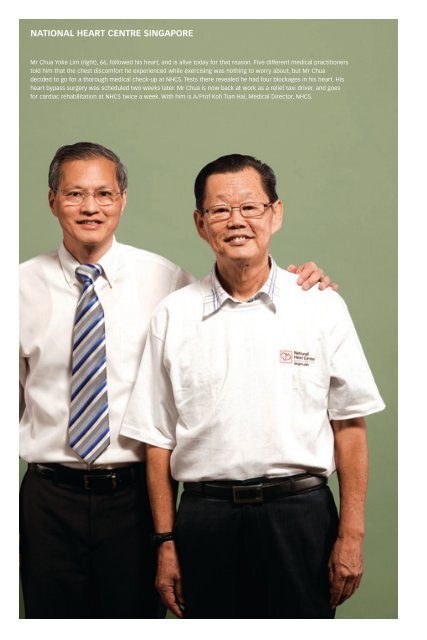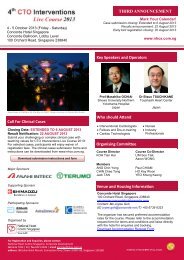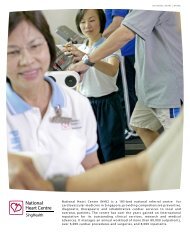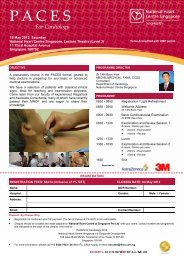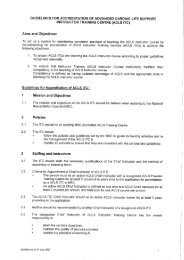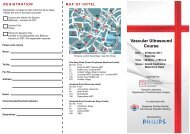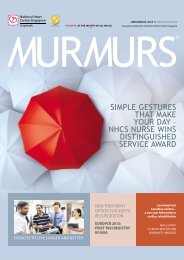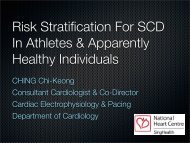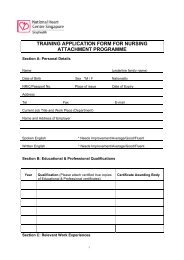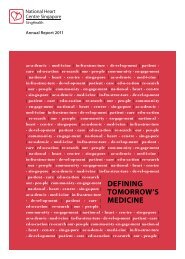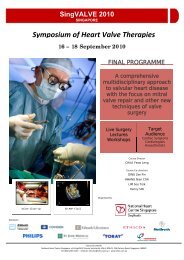NHCS FY2009 Annual Report - National Heart Centre Singapore
NHCS FY2009 Annual Report - National Heart Centre Singapore
NHCS FY2009 Annual Report - National Heart Centre Singapore
- No tags were found...
You also want an ePaper? Increase the reach of your titles
YUMPU automatically turns print PDFs into web optimized ePapers that Google loves.
NATIONAL HEART CENTRE SINGAPOREMr Chua Yoke Lim (right), 66, followed his heart, and is alive today for that reason. Five different medical practitionerstold him that the chest discomfort he experienced while exercising was nothing to worry about, but Mr Chuadecided to go for a thorough medical check-up at <strong>NHCS</strong>. Tests there revealed he had four blockages in his heart. Hisheart bypass surgery was scheduled two weeks later. Mr Chua is now back at work as a relief taxi driver, and goesfor cardiac rehabilitation at <strong>NHCS</strong> twice a week. With him is A/Prof Koh Tian Hai, Medical Director, <strong>NHCS</strong>.
76 / 77“ As the standard bearer for cardiovascular care, the <strong>National</strong> <strong>Heart</strong> <strong>Centre</strong> <strong>Singapore</strong> (<strong>NHCS</strong>)is constantly seeking new treatment options that are evidence-based to give our patientsthe best care possible. In 2009, <strong>NHCS</strong> introduced a number of new therapies that allowus to provide timely and optimal patient care. This includes the hybrid operating theatre,which greatly enhances patient safety and helps patients save time and money with feweroperations, quicker recovery and shorter hospital stays.<strong>NHCS</strong> also introduced the magnetic navigation system for electrophysiological proceduresto treat patients with complex arrhythmias. With greater navigation precision, we are ableto shorten the procedure time and enhance patient safety.On the education front, <strong>NHCS</strong> joined hands with EuroPCR to launch the first AsiaPCR-SingLIVE. The collaboration helps to bring cutting-edge interventional cardiology to thedoorstep of Asian doctors and paramedical staff, without the need for them to travellong distances to Europe.<strong>NHCS</strong> officially opened the induced Pluripotent Stem Cell (iPS) Laboratory in March 2010with a $10 million grant from the <strong>National</strong> Research Foundation. The new facility willresearch autologous cell therapy for ageing hearts.We will continue to pursue the highest standards of cardiovascular care that is accessibleand affordable to all <strong>Singapore</strong>ans.”Associate Professor Koh Tian HaiMedical Director, <strong>National</strong> <strong>Heart</strong> <strong>Centre</strong> <strong>Singapore</strong>PATIENT CAREThe <strong>National</strong> <strong>Heart</strong> <strong>Centre</strong> <strong>Singapore</strong> (<strong>NHCS</strong>) nowoffers an alternative treatment to atrial fibrillationpatients who are at high risk of stroke from long-termwarfarin medication. Atrial fibrillation is a conditionwhere the heart beats irregularly, which can causeblood clots. Warfarin which is a drug typically usedto address this condition, is not suitable for allpatients as it could cause bleeding, especially inthe elderly. In October last year, <strong>NHCS</strong> performedAsia’s first percutaneous closure of the left atrialappendage using the Watchman device. The deviceis permanently implanted in these high-risk patientsto prevent them from having a stroke caused byblood clots that start in the heart. The Watchmandevice blocks off the left atrial appendage where90 per cent of blood clots in the heart form.Mr Cheong Ching Chuan, 70, was the first toundergo this new procedure. A retiree, Mr Cheonghas long-term atrial fibrillation and was at highrisk of stroke. After he accidentally knocked hishead twice, doctors discontinued his warfarintreatment as he developed haematoma inthe brain. After the successful procedure,Mr Cheong has not experienced any bleeding.Another example of a patient-centric advancementis the introduction of a hybrid operating theatre (OT)that allows hybrid cardiovascular procedures. Withthe hybrid OT, doctors can easily convert a coronaryangioplasty to an open heart bypass surgery ifneeded. This helps to improve patient safety. Thenew setup also helps patients save time and moneywith fewer operations, quicker recovery and shorterhospital stays. It also offers a viable option for veryhigh-risk patients where the non-availability of such afacility in the past meant they could not be treated.
NATIONAL HEART CENTRE SINGAPOREHassan Bin Doll, 59, who suffered from severe aorticstenosis and chronic lung disease, was amongthe earliest to benefit from the new hybrid OT. Hiscondition was so bad that it left him breathless evenwhen sitting down. Because of his poor lung function,traditional valve replacement was ruled out as it wastoo risky. With the hybrid OT, Mr Hassan was able toundergo the percutaneous aortic valve replacement.After a short hospital stay of five days, he wasdischarged and able to resume his normal lifestyle.<strong>NHCS</strong> also introduced a magnetic navigation systemfor electrophysiological procedures to treat patientswith complex abnormal heart rhythms such asrapid or irregular heartbeats. Using computeraidedmagnetic guidance, cardiologists can moreprecisely and accurately navigate the catheters andguidewires within the heart, reducing the proceduretime from four to six hours down to two to threehours. In turn, the new system reduces radiationexposure, enhancing patient safety. In addition, themagnetically-enabled catheters are softer and moreflexible, hence reducing the chance of distorting ordamaging the heart wall to less than 1 per cent from2 to 3 per cent. <strong>NHCS</strong> is the first in Southeast Asiaand among the first few in Asia to introduce this newmagnetic navigation system for catheter ablation.Patients with end-stage heart failure now have amuch improved option for left-ventricular support ofthe heart. A new device, known as <strong>Heart</strong>Mate II, hasa much smaller pump, making it fully implantablewithin patient’s body regardless of patient’s chestcavity size. This makes it suitable for adults withsmaller builds, such as women or Asians. The newdevice can potentially be used for chronic long-termsupport of patients with irreversible heart failure.Mechanical heart assist devices, such as <strong>Heart</strong>Mate IIwhich take over the function of a failing heart bypumping blood around the body, provide criticallyill patients with a way to prolong and improve theirquality of life while waiting for a heart transplant.Young mother, Salina Mohamed So’ot, was given anew lease of life with <strong>Heart</strong>Mate II. Before the surgery,the mother of a three-year-old girl, was bedriddenwith an enlarged heart and severe irregular heartbeat.As her condition was unstable, her chance of gettinga heart transplant was slim. Now, the portabledevice keeps her alive and allows her to look afterher little girl while waiting for a heart transplant.EDUCATIONIn January 2010, the renowned interventionalmeeting, EuroPCR (Paris Course on Revascularisation)partnered with <strong>NHCS</strong> to jointly launch the firstAsiaPCR-SingLIVE, a cardiology conferencecombining EuroPCR and <strong>Singapore</strong> LIVE.EuroPCR is one of the two biggest interventionalmeetings in the world while <strong>Singapore</strong> LIVE is anannual cardiology conference which has beenorganised by <strong>NHCS</strong> since 1989. Each year, over1,000 doctors and healthcare professionals fromaround the globe attend the <strong>Singapore</strong> LIVE courseto benefit from the sharing of current and newinterventional techniques and devices by experts.The collaboration with EuroPCR helps to bringcutting-edge interventional cardiology to Asiandoctors and paramedical staff, eliminating theneed to travel long distances to Europe.RESEARCH<strong>NHCS</strong> officially opened the induced PluripotentStem Cell (iPS) Laboratory in March 2010. Thelaboratory was set up with a grant of up to$10 million awarded by the <strong>National</strong> ResearchFoundation. The new research facility will facilitateresearch into autologous cell therapy for ageinghearts. With this laboratory in place, the Research andDevelopment Unit of <strong>NHCS</strong> has moved into high-value,competitive research involving stem cell technology.In December last year, <strong>NHCS</strong> collaborated with theInstitute of Microelectronics to develop a fasterand simpler test kit for heart attacks. This kit testsfor specific cardiac biomarkers in blood, such astroponin-T and creatinine kinases. Elevated levels oftroponin-T or creatinine kinases in the blood alertthe doctors that a heart attack has taken place. Asthe kits are deployed on-site as opposed to a centrallaboratory, confirmation of the condition is rapid.
78 / 79In May 2009, Mdm Salina Mohamed So’ot, 32, became the first in <strong>Singapore</strong> to get the new <strong>Heart</strong>Mate II artificial heart. The<strong>Heart</strong>Mate II has a smaller pump, making it ideal for patients with slight builds like petite Mdm Salina who stands just 1.56m tall.With her new artificial heart, Mdm Salina can carry on with her life while she waits for a heart transplant. She’s able to savourthe ordinary joys of a walk in the park or time playing with her toddler, without risking her health. With her is Dr C. Sivathasan,Co-Director, <strong>Heart</strong> and Lung Transplant Programme, part of the highly-skilled multidisciplinary team caring for Mdm Salina.
NATIONAL HEART CENTRE SINGAPOREThis is crucial in heart attack scenarios as the fasterand more accurate the diagnosis can be made, thequicker proper care and treatment can be instituted.OUR PEOPLEDr Su Jang Wen, a Consultant at the Departmentof Cardiothoracic Surgery spent two years at theCleveland Clinic <strong>Heart</strong> <strong>Centre</strong>, one of the top heartcentres in the US, under the Health ManpowerDevelopment Programme (HMDP). The trainingexposed him to a full range of complex cardiacoperations especially minimally invasive valvularsurgeries and redo cardiac surgeries, and thoracicoperations with emphasis in minimally invasivethoracic surgery, airway surgery and esophagectomy.The Cleveland Clinic also emphasises research, whichallowed Dr Su to present five papers and publishthree. His training also helped to strengthen therelationship between <strong>NHCS</strong> and the Cleveland Clinic,thus allowing for future exchanges and consultations.Upon his return in 2009, Dr Su aims to establish aminimally invasive surgical service in both cardiac andthoracic surgery to provide patients with less pain,shorter hospital stays and better cosmetic outcomes.Between July 2008 and August 2009, Dr See ChaiKeat, a Consultant at the Department of Cardiologywent on an echocardiography fellowship at thePrincess Alexandra Hospital in Brisbane, Queenslandin Australia. There, he learnt more systematic waysof interpreting stress echocardiography results toimprove the accuracy of the reporting. He also learnedmore about echocardiographic strain and strain-rateimaging, which is non-invasive method for assessingmyocardial regional and global functions. During hisfellowship, he completed close to 1,400 cases ofstress echocardiography and published a number ofresearch papers. Dr See plans to apply his knowledgeby procuring a comprehensive clinical workstationto allow for a more efficient workflow, higher patientthroughput and increased productivity at <strong>NHCS</strong>.Dr David Sim, an Associate Consultant at theDepartment of Cardiology did his heart failurefellowship at The Alfred <strong>Heart</strong> <strong>Centre</strong> in Melbourne,Australia between May 2008 and September 2009.During his fellowship he performed more than 500cases of right heart studies and cardiac biopsies.Right heart studies are performed to monitorthe haemodynamic as part of the pre-transplantworkup. Cardiac biopsies are done after hearttransplants to watch for signs of rejection. Since hisreturn, Dr Sim has adopted a proactive approachto identify and treat heart failure patients at anearly stage to reduce hospitalisation rate, prolongsurvival and give patients a better quality of life.Dr Fong Meng Kum, Assistant Director of Nursing,was awarded the SingHealth-Alice Lee Instituteof Advanced Nursing Scholarship to scholarshipto pursue a PhD degree in clinical education atThe University of Melbourne. For her PhD, Dr Fonginvestigated the effectiveness of clinical supervisionas perceived by new nurses, their preceptors(buddies), and nurse managers/nurse clinicians in sixacute-care hospitals in <strong>Singapore</strong>. She discoveredthat effectiveness was related to the frequency,type and duration of supervision sessions. Herfindings provide a foundation for supporting newnurses in their transition from student to clinician.Dr Fong also presented her research findings at the2009 Shanghai International Nursing Conference. Herresearch paper gained an “Excellent Paper” awardat the conference. The PhD has also given Dr Fong apersonal sense of achievement and has helped her tobetter manage new nurses; taking care of both theirwelfare as well as their professional development.COMMUNITY ENGAGEMENTIn October last year, <strong>NHCS</strong> supported thePresident’s Challenge 2009. Besides raising fundsfor the needy, the centre also garnered 569 smilesunder the SingHealth’s “Healthcare, I Care!” 10KSmiles Project. In addition, 15 staff led by <strong>NHCS</strong>Acting Chief Operating Officer Malcolm Koh spenttime with some 70 elderly folks at the Yong-EnCare <strong>Centre</strong> on 31 October 2009. The staff andresidents sang karaoke, watched a movie, playedball games, and celebrated birthdays. Residentsalso received a goodie bag from <strong>NHCS</strong>.
80 / 81KEY FIGURES FY 09 FY 08SizeBed Complement (as at end Mar) 185 185Beds in Service 183 178Workload per annumBed Occupancy Rate 72.7% 77.6%Inpatient Admissions 9,955 9,863Inpatient Discharges 9,928 9,891Total Patient Days 48,660 50,273Average Length of Stay (days) 4.9 5.1Total Procedures* 6,683 6,291Day Procedures* 34 26Inpatient Procedures* 6,649 6,265Specialist Outpatient ClinicAttendances 101,113 99,355Staffing (as at end Mar)Total 836 754Doctors 85 84Nurses 375 319Allied Health Professionals 117 103Others 260 249Note: Staffing figures refer to Filled Posts, in terms of Full-Time Equivalent,and may not add up to total due to rounding.* Interventional and SurgicalAWARDS & ACCOLADESMay Day Model Partnership Award 2009 (Individual)Chia Li SenGCEO Excellence Awards 2009 – Professional (Medical)A/Prof Terrance Chua<strong>National</strong> Safety and Security WatchGroup (SSWG) Award<strong>NHCS</strong><strong>National</strong> IQC Convention8 Awards – 6 Gold, 2 SilverEducationSingHealth-Lee Foundation Nursing ScholarshipGillian WeeSingHealth-Lee Foundation Nursing AwardsJasmine LeeDuke-NUS GMS Outstanding Innovator Award(Normal Body Module)Dr Kenny SinDuke-NUS GMS Outstanding Innovator Award(Body and Disease Module)A/Prof Hwang Nian ChihPatient CareExcellent Service Awards 200976 staff – 11 Star, 25 Gold, 40 Silver<strong>National</strong> Day Awards 2009 (Efficiency)Ong Bee Geok, Sim Ling Ling, Tay Ai Liu<strong>National</strong> Day Awards 2009 (Long Service)Veronica Kwok Hong Har, Wong Ah NooiMOH Nurses’ Merit Award 2009Foong Jia Yi, Pauline LimResearch<strong>National</strong> Medical Research Council GrantDr Zhong LiangDuke-NUS (Goh Cardiovascular Research Award)Dr Reginald Liew, Dr Tan Swee YawHuman Resource/Talent DevelopmentWork-Life Achiever Award 2009<strong>Singapore</strong> Health Award 2009 (Gold)Healthcare Humanity Awards 2010Dr C Sivathasan, Loo Yu Jen, Jasmine Lee


